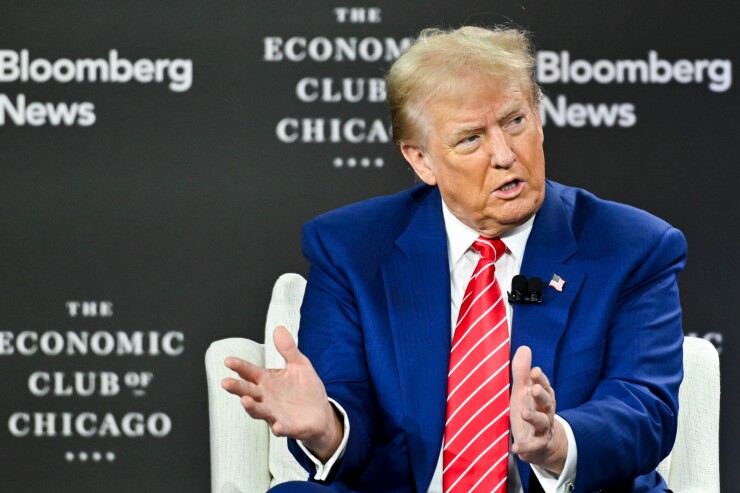Former President Donald Trump said his policies would inspire growth despite adding to the debt as he sought to assuage business leaders who worry his economic plans will fuel inflation.
"We're all about growth," Trump told Bloomberg News Editor-in-Chief John Micklethwait on Tuesday in an interview at the Economic Club of Chicago. "We're going to bring companies back to our country."
Trump defended his proposals to dramatically increase tariffs on foreign goods, saying the proposals were for the "protection of the companies that we have here and the new companies that will move in."

The Republican presidential nominee disputed the notion his tariffs would impact Americans whose jobs depend on trade, saying the losses would be offset by new domestic manufacturing jobs.
"It should have a massive effect, positive effect," Trump said, arguing that new trade levies would pressure companies to reshore manufacturing in the U.S. "The higher the tariff, the more likely it is that the company will come into the United States, and build a factory in the United States so it doesn't have to pay the tariff."
The Republican presidential nominee's comments come exactly three weeks before Election Day in what polls forecast to be a razor-thin contest with Democratic Vice President Harris. Surveys show the U.S. economy is the paramount issue for voters.
Trump in his third run for the White House has been bolstered by broad discontent among business executives and voters at large over President Joe Biden's record. Anxiety over high prices and jobs have left the American public preferring the Republican candidate's approach to that of Harris, polls suggest.
The former president has vowed to carry out an aggressive campaign of deregulation, renew expiring tax cuts, lower the corporate tax rate to 15% from 21%, and offer fresh tax reductions and benefits to bolster domestic manufacturing — policies cheered by prominent Wall Street and corporate leaders.
Trump's tax proposals, as well as dueling tax cuts and benefits pitched by Harris, though, come with stark price tags — in the trillions — and threaten to worsen a U.S. federal deficit that's already historically large. Some investors are betting Trump's policies will leave the U.S. saddled with more debt and higher inflation and interest rates. America's annual deficit is already close to $2 trillion.
Defending tariffs
Trump's economic plan is heavy on tariffs, which he aims to impose on both U.S. allies and adversaries, including a 60% levy on imports from China and 10% duties on the rest of the world. Trump has also insisted new tariffs will help fund his tax cuts, but economists say they are unlikely to create the revenue he needs. The
The former president's tariff agenda threatens to also reduce or redirect trade flows, further impacting revenue. Many economists have warned tariffs would hit U.S. households with what is effectively a tax increase, likely sending inflation higher and raising pressure on the Federal Reserve over interest rates.
Trump also reiterated his pledge to block the sale of US Steel Corp. to Nippon Steel Corp., if the $14.1 billion transaction was concluded by the time he entered office.
"I think it sets a horrible tone," he said of the possible sale, saying that steel was a critical national security interest.
"There are certain companies you have to have," Trump said.
Both Biden and Harris have said they oppose the sale of US Steel to Nippon Steel, an election flashpoint, particularly in swing-state Pennsylvania, where both the American company and the United Steelworkers union — which also opposes the deal — are based.
Trump-Putin relationship
Trump declined to say if he had spoken to Russian President Vladimir Putin since leaving office in 2021, responding to a question about claims laid out in a new book by journalist Bob Woodward.
"Well, I don't comment on that, but I will tell you that if I did, it's a smart thing," Trump said. "If I'm friendly with people, if I have a relationship with people, that's a good thing, not a bad thing. "
Woodward's book cites an unnamed aide to the former president indicating that he spoke to Putin as many as seven times since leaving office. The Trump campaign has called Woodward's claim "made-up stories."
Trump defended their relationship, saying their positive ties were a boon to the U.S. and that he had cultivated connections with the Russian leader even though he had sanctioned the Nord Stream 2 pipeline between Russia and Europe.
Tight race
Trump and Harris in recent weeks have been ramping up their messaging on the economy — in particular in the seven battleground states likely to determine November's election outcome. Harris' entry into the race in July saw her erase much of the lead Trump held when Biden was atop the Democratic ticket, thanks to a surge in party enthusiasm for a new standard-bearer.
But despite a fundraising advantage for Harris that has allowed her to flood the airwaves with advertising and her strong debate performance against Trump, polls show the race tightening again in the final stretch.
The 2024 race has seen Trump solidify his hold on the Republican party, easily vanquishing his primary opponents despite a slew of legal obstacles that include him being the first former US president convicted of a felony.
With his base assured, Trump has sought to bolster his electoral appeal, reaching out to core Democratic constituencies such as Black voters and Hispanics — as well as working-class voters and suburban women — uneasy about economic mobility.





